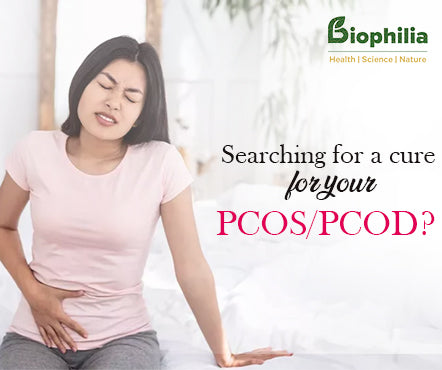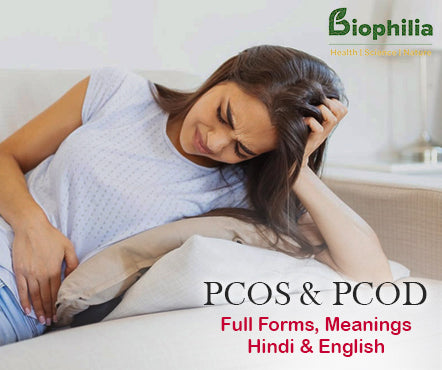Understanding PCOD and PCOS: Symptoms, Causes, Treatment and Management

-
Pcod full form: Polycystic Ovary Disease
-
Pcos means: Polycystic Ovary Syndrome
-
Pcod meaning in Hindi: अनेकान्तिका अंडाशय रोग
-
Pcos vs pcod: Similarities and differences
PCOS and PCOD Symptoms
Common PCOS Symptoms
- Irregular periods: Women with PCOS may experience missed, infrequent, or prolonged menstrual periods.
- Excessive hair growth: Hirsutism, or unwanted hair growth on the face, chest, or back, may occur due to hormonal imbalances.
- Acne: Hormonal changes can lead to oily skin and acne breakouts.
- Weight gain: Many women with PCOS struggle with weight gain, particularly around the waist.
- Enlarged ovaries: Ovaries may be enlarged and contain many small fluid-filled sacs (follicles) surrounding the eggs.
PCOD Problem Symptoms
- Infertility: Difficulty in conceiving due to irregular or absent ovulation.
- Heavy or absent periods: Women with PCOD may have heavy bleeding or no periods at all.
- Weight gain: Like PCOS, women with PCOD may experience weight gain.
- Impact on overall health: PCOD can contribute to the development of other health issues, such as insulin resistance and high cholesterol.
Causes and Risk Factors for PCOS and PCOD

- Genetics: A family history of PCOS or PCOD can increase the risk of developing these conditions, as certain genes may be passed down through generations.
- Hormonal Imbalances: Both PCOS and PCOD involve imbalances in hormones such as estrogen, progesterone, and androgens, which can disrupt the menstrual cycle and reproductive health.
- Insulin Resistance: High insulin levels, often associated with PCOS, can stimulate the ovaries to produce more androgens, leading to hormonal imbalances and various symptoms.
- Obesity: Carrying excess weight can contribute to insulin resistance and hormonal imbalances, increasing the risk of developing PCOS or exacerbating PCOD symptoms.
- Inflammation: Chronic low-grade inflammation has been linked to insulin resistance and the development of PCOS, as it can also contribute to the production of androgens.
- Environmental Factors: Exposure to certain chemicals or toxins in the environment may play a role in the development of PCOS or PCOD by disrupting hormone production and regulation.
- Lifestyle Factors: Poor diet, lack of exercise, and high stress levels can contribute to hormonal imbalances, insulin resistance, and inflammation, increasing the risk of PCOS and PCOD.
- Age: The risk of developing PCOS or PCOD may increase as women approach their mid-to-late reproductive years, as hormonal changes become more pronounced.
- Early Menarche: Girls who start menstruating at an early age may have a higher risk of developing PCOS or PCOD later in life due to the hormonal fluctuations associated with puberty.
- Polycystic Ovary Syndrome (PCOS): Women with PCOS are at an increased risk of developing PCOD due to the shared hormonal imbalances and ovarian cyst formation that characterize both conditions.
PCOS vs PCOD: What's the Difference and similarities?
5 Similarities between PCOS and PCOD:
- Hormonal Imbalance: Both PCOS and PCOD involve an imbalance in hormones, such as estrogen, progesterone, and androgens, affecting the menstrual cycle and reproductive health.
- Cyst Formation: Women with PCOS or PCOD may have multiple small cysts on their ovaries, which can interfere with normal ovulation.
- Irregular Periods: A common symptom shared by both conditions is irregular or absent menstrual periods, making it difficult for women to conceive.
- Weight Gain: Many women with PCOS or PCOD experience weight gain or struggle with weight management, which can exacerbate their symptoms.
- Treatment Approaches: Lifestyle changes, such as adopting a healthy diet and regular exercise, and hormonal medications are often recommended for managing both PCOS and PCOD symptoms.
5 Differences between PCOS and PCOD:
- Metabolic Disorder: PCOS is considered a metabolic disorder, as it often involves insulin resistance and can lead to an increased risk of type 2 diabetes, while PCOD is primarily limited to the ovaries.
- Range of Symptoms: Women with PCOS tend to experience a broader range of symptoms, such as excessive hair growth and acne, due to higher androgen levels, compared to those with PCOD.
- Long-term Health Consequences: PCOS has a higher risk of long-term health complications, including heart disease and type 2 diabetes, whereas PCOD is generally associated with fewer risks.
- Diagnostic Criteria: While both conditions involve hormonal imbalances and ovarian cysts, PCOS diagnosis often requires additional criteria, such as insulin resistance or elevated androgen levels.
- Prevalence: PCOS is more common than PCOD, affecting approximately 6-10% of women of reproductive age, while PCOD is less prevalent in the general population.
PCOS Diagnosis
- Blood tests: Hormone levels, glucose, and cholesterol are checked to identify any abnormalities.
- Ultrasound: A pelvic ultrasound can reveal enlarged ovaries and the presence of multiple cysts.
- Anti-Müllerian hormone (AMH) level: Elevated AMH levels can be an indicator of PCOS.
PCOD Diagnosis
- Cost of diagnosis: The price of PCOD tests may vary depending on the healthcare provider and location.
- Diagnostic tests: Similar to PCOS, blood tests and ultrasound imaging are used to diagnose PCOD.
Treating and Managing PCOS and PCOD
PCOS Treatment Options
- Lifestyle changes: Weight loss, a healthy diet, and regular exercise can help manage PCOS symptoms.
- Medications: Birth control pills, anti-androgen medications, and insulin-sensitizing drugs may be prescribed.
- Long-term management: While there is no cure for PCOS, proper management can help alleviate symptoms and reduce the risk of complications.
PCOD Problem Treatment Medicine
- Medications: Hormonal medications, such as birth control pills or progesterone, may be prescribed to regulate periods.
- Lifestyle changes: A balanced diet and regular exercise can help manage PCOD symptoms and promote overall health.
Navigating PCOS Treatment and Management
PCOS Treatment for Unmarried and Married Women
-
PCOS affects women of all ages and marital statuses, and understanding the available treatment options can empower them to take control of their health.

- Lifestyle changes, such as adopting a healthy diet and engaging in regular exercise, can help manage PCOS symptoms, regardless of marital status.
- Hormonal medications like birth control pills can regulate periods and balance hormone levels, benefiting both unmarried and married women.
- For married women trying to conceive, fertility treatments, such as ovulation-inducing medications or assisted reproductive technologies, can improve the chances of pregnancy.
PCOS Weight Loss: Importance in Treatment
- Weight loss plays a crucial role in managing PCOS, as it can help reduce insulin resistance, regulate hormone levels, and alleviate symptoms.
- Even a modest weight loss of 5-10% can lead to significant improvements in PCOS symptoms and overall health.
- Incorporating regular exercise and a balanced diet rich in whole foods, lean proteins, and healthy fats can help achieve weight loss and improve PCOS management.
PCOS Care Tablet: Medications for Managing Symptoms
Several medications can help manage PCOS symptoms and improve overall health:
- Birth control pills: Regulate menstrual cycles, reduce excessive hair growth, and alleviate acne.
- Anti-androgen medications: Lower androgen levels, reducing hirsutism and acne.
- Metformin: An insulin-sensitizing drug that can help regulate blood sugar levels and improve fertility in some women.
- Clomiphene citrate: A fertility medication that stimulates ovulation, increasing the chances of conception.
- Always consult with a healthcare professional before starting any medication to ensure it is appropriate for your specific situation.
Is PCOS Curable? Understanding Long-term Management
- While there is no cure for PCOS, proper management can help alleviate symptoms and reduce the risk of complications.
- Long-term management includes maintaining a healthy lifestyle, monitoring hormone levels, and staying informed about the latest research and treatment options.
- Regular check-ups with healthcare professionals are essential to ensure that the treatment plan is effective and to make adjustments as needed.
- Emotional and mental health support, such as therapy or support groups, can help women with PCOS cope with the challenges of living with this chronic condition.
PCOS and PCOD Diet and Nutrition
- Foods to include: High-fiber vegetables, lean proteins, and whole grains.
- Foods to avoid: Sugary snacks, refined carbohydrates, and unhealthy fats.
- Supplements: Some women with PCOS may benefit from supplements like inositol, vitamin D, and omega-3 fatty acids.
PCOD Diet
- PCOD-friendly foods: Consume a balanced diet rich in fruits, vegetables, whole grains, and lean proteins.
- Impact on symptoms and overall health: A healthy diet can help manage PCOD symptoms, support weight loss, and improve overall health.
PCOS, PCOD, and Fertility
PCOS and Pregnancy
- Challenges: Women with PCOS may experience difficulty conceiving due to irregular ovulation.
- Treatment options: Fertility medications, such as clomiphene citrate, and assisted reproductive technologies can help improve the chances of conception.
- PCOS ovary and fertility: The presence of multiple cysts can interfere with normal ovulation, affecting fertility.
PCOD and Fertility
- Impact on fertility: Similar to PCOS, PCOD can make it more difficult to conceive due to ovulation issues.
- Treatment options: Lifestyle changes, hormonal medications, and fertility treatments can help improve fertility in women with PCOD.
Coping with PCOS and PCOD: Emotional and Mental Health
- Psychological impact: Hair loss, acne, and other visible symptoms can affect self-esteem and emotional well-being.
- Understanding the impact on mental health: Awareness of the emotional challenges associated with PCOS and PCOD is crucial for overall well-being.
- Support systems and resources: Joining support groups, seeking professional help, and staying informed can help women with PCOS and PCOD navigate the emotional aspects of these conditions.




